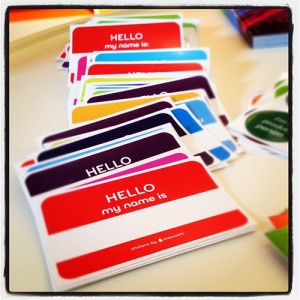 Signer, helper, translator, deaf interpreter, ASL specialist, sitter, volunteer, deaf services… You may be able to think of a few more, these are some of the labels applied to people who do what we do. If you don’t know already, these are all more or less incorrect. Personally, I don’t get too upset when I’m not addressed correctly. When someone uses the wrong terminology, sometimes I ask myself if I know that person’s official job title. Usually I don’t. I should tell you now that the standard terminology is “interpreter for the deaf and hard of hearing,” although most of us find “ASL interpreter” or just “interpreter” acceptable.
Signer, helper, translator, deaf interpreter, ASL specialist, sitter, volunteer, deaf services… You may be able to think of a few more, these are some of the labels applied to people who do what we do. If you don’t know already, these are all more or less incorrect. Personally, I don’t get too upset when I’m not addressed correctly. When someone uses the wrong terminology, sometimes I ask myself if I know that person’s official job title. Usually I don’t. I should tell you now that the standard terminology is “interpreter for the deaf and hard of hearing,” although most of us find “ASL interpreter” or just “interpreter” acceptable.
So what’s in a name?
To be fair, we are linguists. We live and breathe language. We care very much what words mean. We spend our days in deep analysis over what you say and sign, why you choose particular terms, and create equivalent meaning in another language. Consider this when an interpreter corrects you. When an incorrect label is used to describe us, it may also signal to the interpreter that you misunderstand our role. This kind of misunderstanding can be detrimental to your communication, so many of us do our best to educate in the moment.
Signer
This is a person who can sign. Ergo, an interpreter is a person who can interpret.
Helper
This is a person who aids another person in day to day activities. This implies that the person being helped is incapable of carrying out tasks independently and lacks autonomy. This is not the case with the vast majority of deaf and hard of hearing people we serve.
Translator
This person converts the written form of one language into the written form of another. This seems to be one of the more common misnomers. ASL is not a written language so it’s impossible for this to happen in our work.
Deaf Interpreter
A deaf interpreter is deaf. I happen to be hearing. Hearing and deaf interpreters work together in situations where a native of the language is necessary for clear communication. We interpret the spoken language to the deaf interpreter, that person interprets the message to the deaf consumer.
Sitter
This term produces a lot of red flags for me. Sitters work in inpatient medical settings. They sit in the patient’s room to make sure the patient doesn’t do anything to harm her/himself. To call me a sitter degrades the importance of the patient’s communication needs, it stereotypes deaf people as needing observation to avoid injury and it also flies in the face of best practices in medical interpreting (we do not provide medical assistance, nor do we remain in the treatment room when there’s no interpreting to be done).
Volunteer
In some cases this is accurate. I like to think that most interpreters find appropriate ways to volunteer in support of the deaf community. On the other hand, to assume that we’re volunteering our services in an office, plant, factory, clinic or anywhere else that you’re earning money for the work you do doesn’t make sense. We discuss volunteer interpreting in another post, so feel free to check it out.
Photo by Betsy Webber
